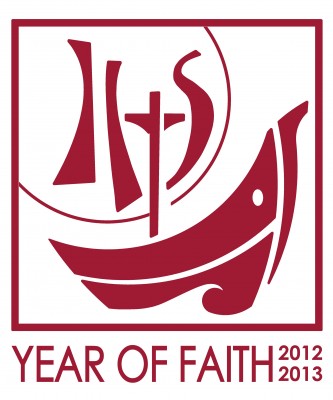“By faith, across the centuries, men and women of all ages, whose names are written in the Book of Life (cf. Rev 7:9, 13:8), have confessed the beauty of following the Lord Jesus wherever they were called to bear witness to the fact that they were Christian: in the family, in the workplace, in public life, in the exercise of the charisms and ministries to which they were called.”*
 Year of Faith
Year of Faith
Today, we are each called to do the same: live our Christian faith personally and share it publicly with the whole wide world. When St. Paul and the first Christians went out to preach the Gospel they went right to where the people were - the public square. Today, our public square is the World Wide Web - Facebook, Google +, YouTube, the great blogosphere - the ‘water well’ that everyone hangs around or passes through on their way to and from work and play. Everyone uses the Internet, this virtual public square, for one thing or another; to buy and sell goods, to trade ideas and solutions, to exchange gossip and news, to communicate with one another. We share everything here, why not our faith?
In his Apostolic Letter, Porta Fidei, for the beginning of the Year of Faith, Pope Benedict IV speaks about a crisis of faith in our culture and within our own Church and he calls us each to a renewal of our faith. He’s not calling us to renew our faith for our own sake only, but also for the sake of others – so that they too may know the reason for why we live as we do - Jesus. We are given this opportunity every time we log on to Facebook or G+, reply to an email, or respond to a comment on a blog or online article. Unfortunately, we have many missed opportunities when it comes to sharing our faith properly in these situations because we assume our faith is implied.
It often happens that Christians are more concerned for the social, cultural and political consequences of their commitment, continuing to think of the faith as a self-evident presupposition for life in society. In reality, not only can this presupposition no longer be taken for granted, but it is often openly denied. Whereas in the past it was possible to recognize a unitary cultural matrix, broadly accepted in its appeal to the content of the faith and the values inspired by it, today this no longer seems to be the case in large swathes of society, because of a profound crisis of faith that has affected many people.*
We can’t take it for granted anymore that everyone understands what it really means to be Catholic or Christian and we can’t assume everyone knows what we each believe unless we say so. Thanks to the internet, we are able to communicate more quickly and with more people than ever before. Now we can enjoy instant conversation with friends, family and coworkers without cleaning the house first or getting out of our pajamas. Talking with people without having to leave the house has its perks; but, when it comes to our faith, we can’t hide this radiant light behind the computer screen.
During this Year of Faith, we are called to renew our faith and in turn the faith of our fellow Catholics, Christians and all of God’s people. We are called to share Who our faith is about and how our faith guides and shapes us in our daily lives.
What the world is in particular need of today is the credible witness of people enlightened in mind and heart by the word of the Lord, and capable of opening the hearts and minds of many to the desire for God and for true life, life without end.*
In a particular way, we can answer this call of renewal and evangelization through our interactions in the virtual public square of today. We can share the beautiful teachings of Christ passed to us through the power of the Holy Spirit present in the Catholic Church in word and example. It can be as simple as taking the time to send a quick email or message to a friend letting them know you are praying for them. Adding a sincere “God bless you” or “In Christ” in your email signature reminds the recipient Who we ultimately work and live our lives for.
If you blog, write about your faith and share what you believe. There’s no need to reinvent the wheel, use the Creed, the Catechism of the Catholic Church, the Compendium of the Social Doctrine of the Church, the numerous Papal encyclicals and other Church documents to reveal what our faith really teaches. It is easy to judge Catholics who do not honor Church teaching but perhaps they are not fully aware of what our faith really says. “Evidently, knowledge of the content of faith is essential for giving one’s own assent, that is to say for adhering fully with intellect and will to what the Church proposes.”*
When we open this “door of faith”, as Pope Benedict calls it, it’s essential to remember charity. “Faith without charity bears no fruit, while charity without faith would be a sentiment constantly at the mercy of doubt. Faith and charity each require the other…. Through faith, we can recognize the face of the risen Lord in those who ask for our love. ‘As you did it to one of the least of these my brethren, you did it to me’ (Mt 25:40).”* This is especially true in the digital world where nothing is forgotten. Whether it’s in an email, private message, wall post, or comment in the combox, we must share our faith courageously and without apology; but, it must be packaged in a caring and charitable way or we risk the door slamming in our faces. Before hitting send, share, post, or reply remember there is a human person on the other end longing and looking for the light of Christ.
* Pope Benedict XVI, Apostolic Letter Porta Fidei (October 11, 2012)
Copyright 2012 Erika Higgins
About the Author

Erika Marie
Erika Marie is a simple Catholic, Wife, and Mama. She relishes snuggles and free time with her family and enjoys reading, writing, blogging, and has a slightly obsessive addiction to creating Canva graphics. Enjoy more reflections by Erika at her personal simplemama blog.


.png?width=1806&height=731&name=CatholicMom_hcfm_logo1_pos_871c_2728c%20(002).png)
Comments